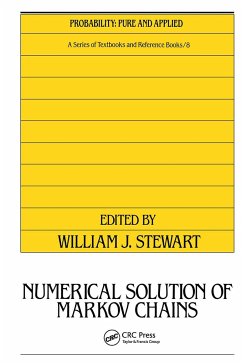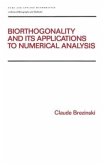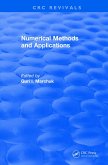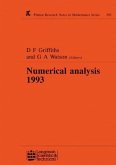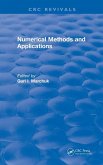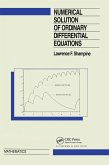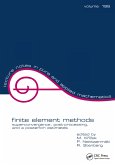- Gebundenes Buch
- Merkliste
- Auf die Merkliste
- Bewerten Bewerten
- Teilen
- Produkt teilen
- Produkterinnerung
- Produkterinnerung
Papers presented at a workshop held January 1990 (location unspecified) cover just about all aspects of solving Markov models numerically. There are papers on matrix generation techniques and generalized stochastic Petri nets; the computation of stationary distributions, including aggregation/disagg
Andere Kunden interessierten sich auch für
![A Numerical Library in C for Scientists and Engineers A Numerical Library in C for Scientists and Engineers]() Hang T. LauA Numerical Library in C for Scientists and Engineers217,99 €
Hang T. LauA Numerical Library in C for Scientists and Engineers217,99 €![Biorthogonality and its Applications to Numerical Analysis Biorthogonality and its Applications to Numerical Analysis]() Claude BrezinskiBiorthogonality and its Applications to Numerical Analysis297,99 €
Claude BrezinskiBiorthogonality and its Applications to Numerical Analysis297,99 €![Numerical Methods and Applications (1994) Numerical Methods and Applications (1994)]() Numerical Methods and Applications (1994)73,99 €
Numerical Methods and Applications (1994)73,99 €![Numerical Analysis 1993 Numerical Analysis 1993]() D. F. GriffithsNumerical Analysis 1993278,99 €
D. F. GriffithsNumerical Analysis 1993278,99 €![Numerical Methods and Applications (1994) Numerical Methods and Applications (1994)]() Numerical Methods and Applications (1994)239,99 €
Numerical Methods and Applications (1994)239,99 €![Numerical Solution of Ordinary Differential Equations Numerical Solution of Ordinary Differential Equations]() L. F. ShampineNumerical Solution of Ordinary Differential Equations82,99 €
L. F. ShampineNumerical Solution of Ordinary Differential Equations82,99 €![Finite Element Methods Finite Element Methods]() M. Krizek / P. Neittaanmaki / R. Stenberg (eds.)Finite Element Methods347,99 €
M. Krizek / P. Neittaanmaki / R. Stenberg (eds.)Finite Element Methods347,99 €-
-
-
Papers presented at a workshop held January 1990 (location unspecified) cover just about all aspects of solving Markov models numerically. There are papers on matrix generation techniques and generalized stochastic Petri nets; the computation of stationary distributions, including aggregation/disagg
Produktdetails
- Produktdetails
- Verlag: CRC Press
- Seitenzahl: 728
- Erscheinungstermin: 23. Mai 1991
- Englisch
- Abmessung: 240mm x 161mm x 43mm
- Gewicht: 1244g
- ISBN-13: 9780824784058
- ISBN-10: 0824784057
- Artikelnr.: 21352297
- Herstellerkennzeichnung
- Libri GmbH
- Europaallee 1
- 36244 Bad Hersfeld
- gpsr@libri.de
- Verlag: CRC Press
- Seitenzahl: 728
- Erscheinungstermin: 23. Mai 1991
- Englisch
- Abmessung: 240mm x 161mm x 43mm
- Gewicht: 1244g
- ISBN-13: 9780824784058
- ISBN-10: 0824784057
- Artikelnr.: 21352297
- Herstellerkennzeichnung
- Libri GmbH
- Europaallee 1
- 36244 Bad Hersfeld
- gpsr@libri.de
William J. Stewart (North Carolina State University, Raleigh)
1. Numerical Markov Queuing Analysis: A Twenty-Five Year Odyssey 2. A
Methodology for the Specification and Generation of Markov Models 3. MARCA:
Markov Chain Analyzer, A Software Package for Markov Modeling 4. A Survey
of Aggregation-Disaggregation in Large Markov Chains 5. An Exact
Aggregation-Disaggregation Algorithm for Mandatory Set Decomposable Markov
Chains 6. On the Sensitivity of Nearly Uncoupled Markov Chains 7.
Sensitivity Analysis, Ergodicity Coefficients, and Rank-One Updates for
Finite Markov Chains 8. Iterative Methods for Determining Derivatives of
Stationary Distributions of Finite Markov Chains 9. The Joint Distribution
of Arrivals and Departures in Quasi-Birth-and-Death Processes 10. Queuing
Systems Having Phase-Dependent Arrival and Service Rates 11. A Generalized
Recursive Technique for Finite Markov Processes 12. A Theory of Statistical
Multiplexing of Markovian Sources: Spectral Expansions and Algorithms 13.
Some Markov Chain Problems in the Evaluation of Multiple-Access Protocols
14. A Stochastic Model for a Computer Communication Network Node with Phase
Type Timeout Periods 15. Numerical Comparison of the Replacement Process
Approach with the Aggregation-Disaggregation Algorithm for Row-Continuous
Markov Chains 16. Analysis of a Loss System with Mutual Overflow in a
Markovian Environment 17. Computing Conditional Distributions of Queuing
Network Matrices 18. Finding Transient Solutions in Markovian Event Systems
Through Randomization 19. A Splitting Technique for Markov Chain Transient
Solution 20. Transient Solutions of Time-Inhomogeneous Markov Reward Models
with Discontinuous Rates 21. First Passage Times in Nearly Decomposable
Markov Chains 22. Bounds for Transient Characteristics of Large or Infinite
Markov Chains 23. Evaluating Bounds on Steady-State Availability of
Repairable Systems from Markov Models 24. Projection Methods for the
Numerical Solution of Markov Chain Models 25. The Biconjugate Gradient
Method for Obtaining the SteadyState Probability Distributions of Markovian
Multiechelon Repairable Item Inventory Systems 26. Computing the Stationary
Distribution Vector of an Irreducible Markov Chain on a Shared-Memory
Multiprocessor 27. Steady-State Behavior of Interacting Queues: A Numerical
Approach 28. The Most Likely Steady State for Large Numbers of Stochastic
Traveling Salesmen 29. Combinatorial Optimization, Markov Chains, and
Stochastic Automata 30. Solution of Large GSPN Models 31. On Bounds for
Token Probabilities in a Class of Generalized Stochastic Petri Nets 32. The
Importance of Bias Terms for Error Bounds and Comparison Results
Methodology for the Specification and Generation of Markov Models 3. MARCA:
Markov Chain Analyzer, A Software Package for Markov Modeling 4. A Survey
of Aggregation-Disaggregation in Large Markov Chains 5. An Exact
Aggregation-Disaggregation Algorithm for Mandatory Set Decomposable Markov
Chains 6. On the Sensitivity of Nearly Uncoupled Markov Chains 7.
Sensitivity Analysis, Ergodicity Coefficients, and Rank-One Updates for
Finite Markov Chains 8. Iterative Methods for Determining Derivatives of
Stationary Distributions of Finite Markov Chains 9. The Joint Distribution
of Arrivals and Departures in Quasi-Birth-and-Death Processes 10. Queuing
Systems Having Phase-Dependent Arrival and Service Rates 11. A Generalized
Recursive Technique for Finite Markov Processes 12. A Theory of Statistical
Multiplexing of Markovian Sources: Spectral Expansions and Algorithms 13.
Some Markov Chain Problems in the Evaluation of Multiple-Access Protocols
14. A Stochastic Model for a Computer Communication Network Node with Phase
Type Timeout Periods 15. Numerical Comparison of the Replacement Process
Approach with the Aggregation-Disaggregation Algorithm for Row-Continuous
Markov Chains 16. Analysis of a Loss System with Mutual Overflow in a
Markovian Environment 17. Computing Conditional Distributions of Queuing
Network Matrices 18. Finding Transient Solutions in Markovian Event Systems
Through Randomization 19. A Splitting Technique for Markov Chain Transient
Solution 20. Transient Solutions of Time-Inhomogeneous Markov Reward Models
with Discontinuous Rates 21. First Passage Times in Nearly Decomposable
Markov Chains 22. Bounds for Transient Characteristics of Large or Infinite
Markov Chains 23. Evaluating Bounds on Steady-State Availability of
Repairable Systems from Markov Models 24. Projection Methods for the
Numerical Solution of Markov Chain Models 25. The Biconjugate Gradient
Method for Obtaining the SteadyState Probability Distributions of Markovian
Multiechelon Repairable Item Inventory Systems 26. Computing the Stationary
Distribution Vector of an Irreducible Markov Chain on a Shared-Memory
Multiprocessor 27. Steady-State Behavior of Interacting Queues: A Numerical
Approach 28. The Most Likely Steady State for Large Numbers of Stochastic
Traveling Salesmen 29. Combinatorial Optimization, Markov Chains, and
Stochastic Automata 30. Solution of Large GSPN Models 31. On Bounds for
Token Probabilities in a Class of Generalized Stochastic Petri Nets 32. The
Importance of Bias Terms for Error Bounds and Comparison Results
1. Numerical Markov Queuing Analysis: A Twenty-Five Year Odyssey 2. A
Methodology for the Specification and Generation of Markov Models 3. MARCA:
Markov Chain Analyzer, A Software Package for Markov Modeling 4. A Survey
of Aggregation-Disaggregation in Large Markov Chains 5. An Exact
Aggregation-Disaggregation Algorithm for Mandatory Set Decomposable Markov
Chains 6. On the Sensitivity of Nearly Uncoupled Markov Chains 7.
Sensitivity Analysis, Ergodicity Coefficients, and Rank-One Updates for
Finite Markov Chains 8. Iterative Methods for Determining Derivatives of
Stationary Distributions of Finite Markov Chains 9. The Joint Distribution
of Arrivals and Departures in Quasi-Birth-and-Death Processes 10. Queuing
Systems Having Phase-Dependent Arrival and Service Rates 11. A Generalized
Recursive Technique for Finite Markov Processes 12. A Theory of Statistical
Multiplexing of Markovian Sources: Spectral Expansions and Algorithms 13.
Some Markov Chain Problems in the Evaluation of Multiple-Access Protocols
14. A Stochastic Model for a Computer Communication Network Node with Phase
Type Timeout Periods 15. Numerical Comparison of the Replacement Process
Approach with the Aggregation-Disaggregation Algorithm for Row-Continuous
Markov Chains 16. Analysis of a Loss System with Mutual Overflow in a
Markovian Environment 17. Computing Conditional Distributions of Queuing
Network Matrices 18. Finding Transient Solutions in Markovian Event Systems
Through Randomization 19. A Splitting Technique for Markov Chain Transient
Solution 20. Transient Solutions of Time-Inhomogeneous Markov Reward Models
with Discontinuous Rates 21. First Passage Times in Nearly Decomposable
Markov Chains 22. Bounds for Transient Characteristics of Large or Infinite
Markov Chains 23. Evaluating Bounds on Steady-State Availability of
Repairable Systems from Markov Models 24. Projection Methods for the
Numerical Solution of Markov Chain Models 25. The Biconjugate Gradient
Method for Obtaining the SteadyState Probability Distributions of Markovian
Multiechelon Repairable Item Inventory Systems 26. Computing the Stationary
Distribution Vector of an Irreducible Markov Chain on a Shared-Memory
Multiprocessor 27. Steady-State Behavior of Interacting Queues: A Numerical
Approach 28. The Most Likely Steady State for Large Numbers of Stochastic
Traveling Salesmen 29. Combinatorial Optimization, Markov Chains, and
Stochastic Automata 30. Solution of Large GSPN Models 31. On Bounds for
Token Probabilities in a Class of Generalized Stochastic Petri Nets 32. The
Importance of Bias Terms for Error Bounds and Comparison Results
Methodology for the Specification and Generation of Markov Models 3. MARCA:
Markov Chain Analyzer, A Software Package for Markov Modeling 4. A Survey
of Aggregation-Disaggregation in Large Markov Chains 5. An Exact
Aggregation-Disaggregation Algorithm for Mandatory Set Decomposable Markov
Chains 6. On the Sensitivity of Nearly Uncoupled Markov Chains 7.
Sensitivity Analysis, Ergodicity Coefficients, and Rank-One Updates for
Finite Markov Chains 8. Iterative Methods for Determining Derivatives of
Stationary Distributions of Finite Markov Chains 9. The Joint Distribution
of Arrivals and Departures in Quasi-Birth-and-Death Processes 10. Queuing
Systems Having Phase-Dependent Arrival and Service Rates 11. A Generalized
Recursive Technique for Finite Markov Processes 12. A Theory of Statistical
Multiplexing of Markovian Sources: Spectral Expansions and Algorithms 13.
Some Markov Chain Problems in the Evaluation of Multiple-Access Protocols
14. A Stochastic Model for a Computer Communication Network Node with Phase
Type Timeout Periods 15. Numerical Comparison of the Replacement Process
Approach with the Aggregation-Disaggregation Algorithm for Row-Continuous
Markov Chains 16. Analysis of a Loss System with Mutual Overflow in a
Markovian Environment 17. Computing Conditional Distributions of Queuing
Network Matrices 18. Finding Transient Solutions in Markovian Event Systems
Through Randomization 19. A Splitting Technique for Markov Chain Transient
Solution 20. Transient Solutions of Time-Inhomogeneous Markov Reward Models
with Discontinuous Rates 21. First Passage Times in Nearly Decomposable
Markov Chains 22. Bounds for Transient Characteristics of Large or Infinite
Markov Chains 23. Evaluating Bounds on Steady-State Availability of
Repairable Systems from Markov Models 24. Projection Methods for the
Numerical Solution of Markov Chain Models 25. The Biconjugate Gradient
Method for Obtaining the SteadyState Probability Distributions of Markovian
Multiechelon Repairable Item Inventory Systems 26. Computing the Stationary
Distribution Vector of an Irreducible Markov Chain on a Shared-Memory
Multiprocessor 27. Steady-State Behavior of Interacting Queues: A Numerical
Approach 28. The Most Likely Steady State for Large Numbers of Stochastic
Traveling Salesmen 29. Combinatorial Optimization, Markov Chains, and
Stochastic Automata 30. Solution of Large GSPN Models 31. On Bounds for
Token Probabilities in a Class of Generalized Stochastic Petri Nets 32. The
Importance of Bias Terms for Error Bounds and Comparison Results

